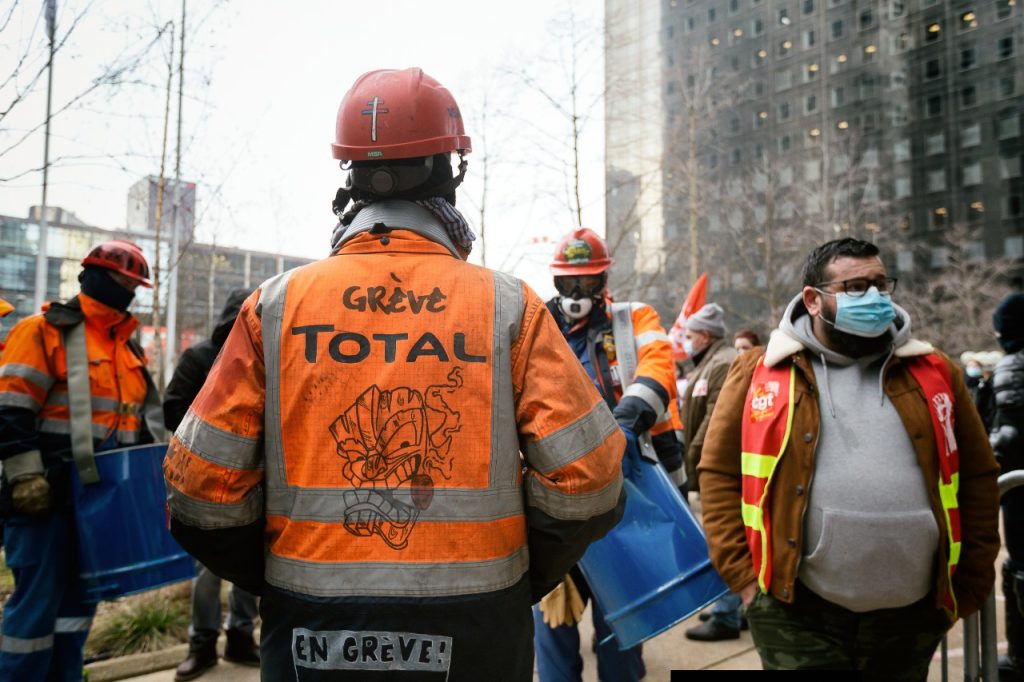Falta de combustibles, largas colas e incidentes en estaciones de servicio, intimaciones de Macron a los obreros de las refinerías petroleras en lucha, la caldera social en Francia acumula presión. Al conflicto se suman, entre otras protestas, una movilización este domingo 16 de octubre contra la vida cara y una marcha nacional con paro de los ferroviarios el martes 18, ambas en París. Es la lucha de clases, que le dicen…
Pablo Vasco
El clima de huelga se extiende por el país como una mancha de petróleo. Varios miles de trabajadores refineros de la Exxon Mobil (Esso) y de la TotalEnergies están en huelga por aumento salarial desde hace más de tres semanas unos y hace dos los otros. El presidente Emmanuel Macron los acusó de desabastecer y “tomar de rehén” a la población, en tanto que su primera ministra Élisabeth Borne lanzó el martes 11 un ataque directo contra el derecho constitucional de huelga: inició el procedimiento de intimación para obligarlos a reponer un servicio mínimo y así desbloquear el funcionamiento los depósitos de la Exxon de Fos-sur-Mer y Notre-Dame-de-Gravenchon.
El gobierno está enviando intimaciones a otras refinerías. En caso de negativa a cumplirla, los trabajadores se exponen a una pena de prisión por seis meses y una multa de 10.000 euros. Al momento de cerrar este artículo, en Fos-sur-Mer se acordó un desbloqueo parcial pero el depósito de Notre-Dame-de-Gravenchon sigue bloqueado. Por cierto, si el conflicto se agrava el gobierno evalúa apelar a la represión policial.
Ante el reclamo obrero, que no es de primas por única vez sino de un 10% de aumento salarial ya que se espera una inflación anual en torno a esa cifra, la patronal de la multinacional Total no ofrece más que un magro 6%. Los sindicatos CFDT y CGC, opuestos a la huelga, acordaron un 7% promedio para 2023 y una prima, en tanto que la CGT hasta ahora no acepta. La Total obtuvo 13.600 millones de euros de ganancias netas el año pasado, otros más de 10.000 millones el primer semestre de este año “gracias” a la guerra en Ucrania y se apresta a girar 2.600 millones a sus accionistas. El año pasado, Patrick Pouyanné, su presidente-director general (PDG), se aumentó su salario en un 52%. Tanta indignación causó semejante privilegio que el diputado Patrick Vignal (Renacimiento, macronista) lo acusó de “tomar a la clase política por imbéciles” y el diputado Hadrien Clouet (NUPES, reformista) dijo que “es la única persona del país a quien habría que intimar”.
Las amenazas del gobierno no logran amedrentar a los huelguistas, sino que generan muestras de solidaridad de otros sectores gremiales. Numerosos sindicatos anuncian que irán a la huelga si se concretan sanciones, como la Federación CGT de Minas y Energía y su par de Química. Y los empleados de las estaciones de servicio Argedis, filial del Grupo Total, se sumaron a la huelga desde el martes 11.

Asimismo, este domingo 16 la LFI-NUPES que lidera Mélenchon convoca a una manifestación “contra la vida cara y la inacción climática”, cuyas demandas son: aumento de salarios y ayudas sociales, gravar ya las superganancias, no al aumento de la edad jubilatoria, subsidio juvenil de autonomía, congelamiento de las tarifas eléctricas e inversiones masivas en energías y medidas ecológicas. Si bien no es un programa anticapitalista de fondo, son reclamos de emergencia justos. El problema es que la NUPES se centra en la acción electoral y parlamentaria en vez de impulsar un verdadero plan de lucha junto a sindicatos y movimientos sociales combativos. Por ejemplo sobre el impuesto a las superganancias proponen llamar a un referéndum, cuyos trámites de aprobación en el Parlamento, reglamentación y posterior convocatoria podrían tardar casi dos años… hasta las próximas elecciones.
A su vez, en el sector de la energía nuclear -que en Francia provee más del 70% del servicio-, también hubo paros parciales en Gravelines, la principal central del país, y en otras centrales. Y organizada con importantes asambleas de base en las estaciones y depósitos ferroviarios y de autobuses de París y otras ciudades, la huelga del martes 18 por aumento salarial se puede convertir en una jornada nacional de acciones por el salario y en repudio a las intimaciones contra los petroleros. El mismo 18 se realizará una huelga y marcha al Ministerio de Educación de los docentes de las escuelas profesionales (técnicas), contra la reforma del gobierno que procura subordinarlas a los intereses del mercado capitalista.
Ya la jornada nacional de huelgas y marchas del 29 de setiembre, aunque parcial, mostró en las calles la voluntad de lucha obrera, juvenil y popular. En medio de una conflictividad social que crece, lamentablemente los principales partidos del trotskismo están a la retaguardia de la situación. Lutte Ouvrière habla de “una situación de retroceso y crecimiento de la extrema derecha”, en tanto que el NPA en su congreso de diciembre pretende expulsar a las tendencias internas combativas y su vocero Philippe Poutou plantea que el partido sea el ala “de combate” de la izquierda institucionalista de LFI-NUPES. En ese marco, desde la LIS y nuestros militantes en Francia sostenemos que el reagrupamiento de las fuerzas consecuentes de la extrema izquierda en un mismo espacio político, en base a un programa socialista revolucionario de ruptura con el capitalismo, es el desafío que sigue abierto.




